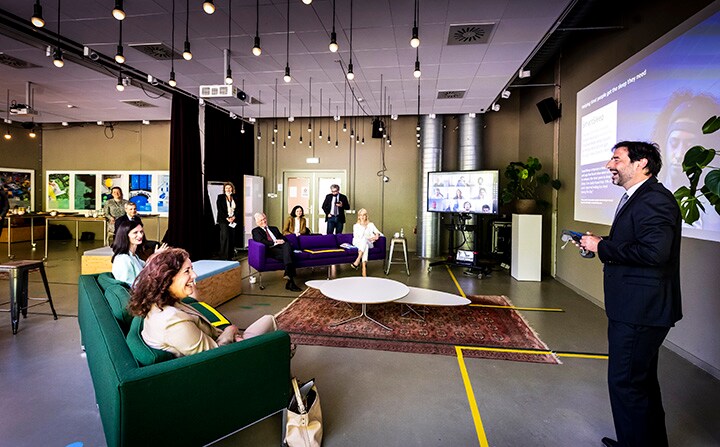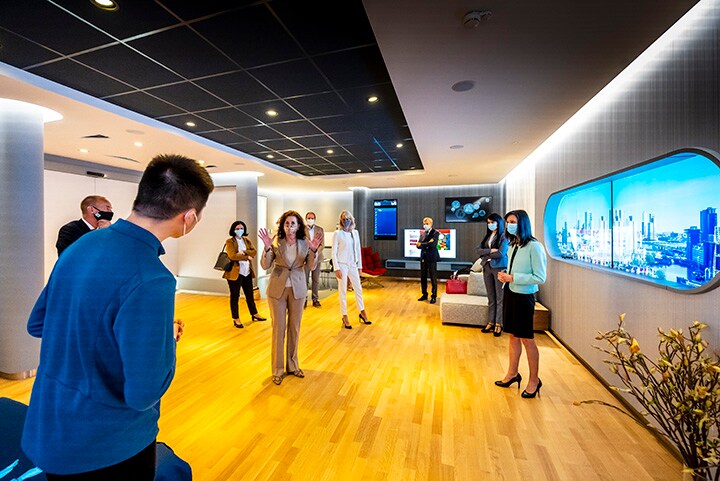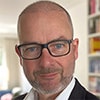Artificial intelligence (AI) and machine learning can revolutionize innovation in healthcare. Public-private collaboration on a European level is vital if we want to optimize the potential of AI.
Frans van Houten, CEO Royal Philips, further expanded on this idea during a visit of Mariya Gabriel, European Commissioner for Innovation, Research, Culture, Education and Youth, Ingrid van Engelshoven, Dutch minister of Education, Culture and Science and Mona Keijzer, Dutch state secretary for Economic Affairs and Climate.
“I am so pleased that we have delegates from the European Commission and the Dutch Government here today,” said Frans. “It is important to have dialogues like this. When you look at the world right now, there are several challenges that we face. It is my strong conviction that we can tackle those with innovation, but only if we collaborate.
In the world, we depend on one another, something that has again been demonstrated by the COVID pandemic. If we inspire each other and raise the bar on what we expect from one another, we can do so much. At Philips we always innovate together with our customers; inviting them to the table gives innovation so much more impact.”

European innovation hubs
Hans Hofstraat, Vice President Research at Philips, elaborated on the importance of European innovation hubs for the global health technology company: “60 percent of our research staff is based in the Europe, with important labs in the Netherlands, UK, Germany and France. In these innovation centers, we work on the healthcare technology of tomorrow, with a strong and increasing focus on leveraging the opportunities offered by digital technologies.
As Casper Garos, Head of Public-Private Partnerships, explained, ‘’European research and innovation programs like Horizon 2020 have been instrumental in extending Philips’ innovation footprint in Europe. Since 1984, Philips has been involved in more than 1,200 EU projects. Currently we are involved in 22 projects that are funded by the Marie Sklodowska Curie Actions (MSCA), with 15 PhDs working at Philips at any point in time.”
AI needs to learn to communicate like humans do
One of these MSCA projects is PhilHumans, in which Philips collaborates with several academic and commercial partners to train the next generation of researchers in innovative Artificial Intelligence. “Our goal is to make the interaction between people and personal health intuitive and advanced,” said Aki Härmä, Data & AI Scientist, who coordinates the Philips research team within PhilHumans.
“AI is very important in healthcare, but it must be trained. For example, to learn how to communicate like humans do. It needs to understand body language and be able to analyze facial expressions in order to pick up signals that are important in conversations.”

Milan Petković, Head of Research AI Data Science & Digital Twin demonstrated several Philips solutions that are built on artificial intelligence. “Our Intellivue Guardian software is able to detect deterioration of patients at an early stage, because we collected a lot of data on vital signs. Thanks to machine learning, the software got better and better at detecting early warning signs.”
Some innovations are built on data acquired from the United States, Milan explained: “It would be great if we could do more of that in the European Union – making use of available patient data for innovation. Why can’t we facilitate that people can donate their data for healthcare innovation.
In the near future, AI will be embedded in all innovations. The question we need to ask is; how can we enable the use of data in a way that protects the privacy and security of patients. We need to look forward and unlock data. Today, data in Europe is completely fragmented and not easy to unlock. If we don’t act, it will curtail the progress of innovation.”
You can read this article in Dutch here.
Share on social media
Topics
Contact

Joost Maltha
Philips Global Press Office Tel: +31 6 10 55 8116
You are about to visit a Philips global content page
Continue












